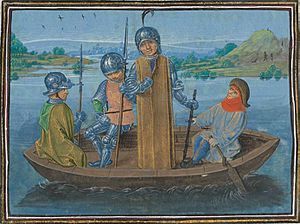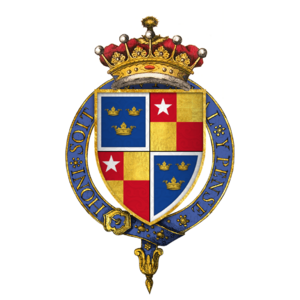Robert de Vere, Duke of Ireland facts for kids
Quick facts for kids
Robert de Vere
|
|
|---|---|
| Duke of Ireland | |

Robert de Vere, Duke of Ireland, fleeing Radcot Bridge, 1387, taken from the Gruthuse manuscript of Froissart's Chroniques (circa 1475)
|
|
| Born | 16 January 1362 |
| Died | 22 November 1392 (aged 30) Louvain |
| Spouse(s) | |
| Father | Thomas de Vere, 8th Earl of Oxford |
| Mother | Maud de Ufford |
Robert de Vere, Duke of Ireland, KG (16 January 1362 – 22 November 1392) was a close friend and companion of King Richard II of England. He was the ninth Earl of Oxford. He was also the first and only Duke of Ireland and Marquess of Dublin. Robert de Vere was also the first person in England to be given the title of a Marquess.
Early Life and Titles
Robert de Vere was born on January 16, 1362. He was the only son of Thomas de Vere, 8th Earl of Oxford and Maud de Ufford. When his father passed away in 1371, Robert became the Earl of Oxford.
King Richard II really liked Robert. The King gave him new and important titles. In 1385, Robert was made the Marquess of Dublin. This was a brand new title in England! The next year, in 1386, he became the Duke of Ireland. He was only the second person in England, not from the royal family, to be made a Duke.
Many powerful nobles did not like how close Robert was to King Richard. They also disliked that Robert received these new, high-ranking titles.
Robert was married to Philippa de Coucy. She was King Richard's first cousin. In 1387, Robert and Philippa separated and later divorced. Robert then married Agnes de Launcekrona.
Downfall and Exile
Robert de Vere was not popular with many other nobles and important people. His close friendship with King Richard was one reason why other nobles started to oppose the King's rule. This group of nobles was known as the Lords Appellant.
In 1387, Robert led King Richard's army in a battle. This was the Battle of Radcot Bridge, near Oxford. Robert's forces were defeated by the Lords Appellant. He had to flee the battle, leaving his soldiers without a leader. They were forced to surrender. After this defeat, Robert traveled abroad and lived in exile.
In 1388, a special meeting of Parliament, called the Merciless Parliament, took place. Robert was found guilty of treason even though he was not there. He was sentenced to death. He also lost all his titles and lands. People who worked with him were also affected. For example, his team that managed Ireland was dismissed.
Death and Legacy
Robert de Vere died in 1392 near Louvain. He passed away from injuries he got during a boar hunt.
Three years later, on November 22, 1395, King Richard II had Robert's body brought back to England. It was buried in England. A writer from that time, Thomas Walsingham, wrote that many important nobles did not go to the re-burial ceremony. He said they still "had not yet digested their hatred" for Robert. The King was very sad. He had the coffin opened so he could kiss his lost friend's hand and see his face one last time.
After Robert's death, his uncle, Sir Aubrey de Vere, got back the family titles and lands. He became the 10th Earl of Oxford. The special titles of Duke of Ireland and Marquess of Dublin ended with Robert.
 | Kyle Baker |
 | Joseph Yoakum |
 | Laura Wheeler Waring |
 | Henry Ossawa Tanner |


